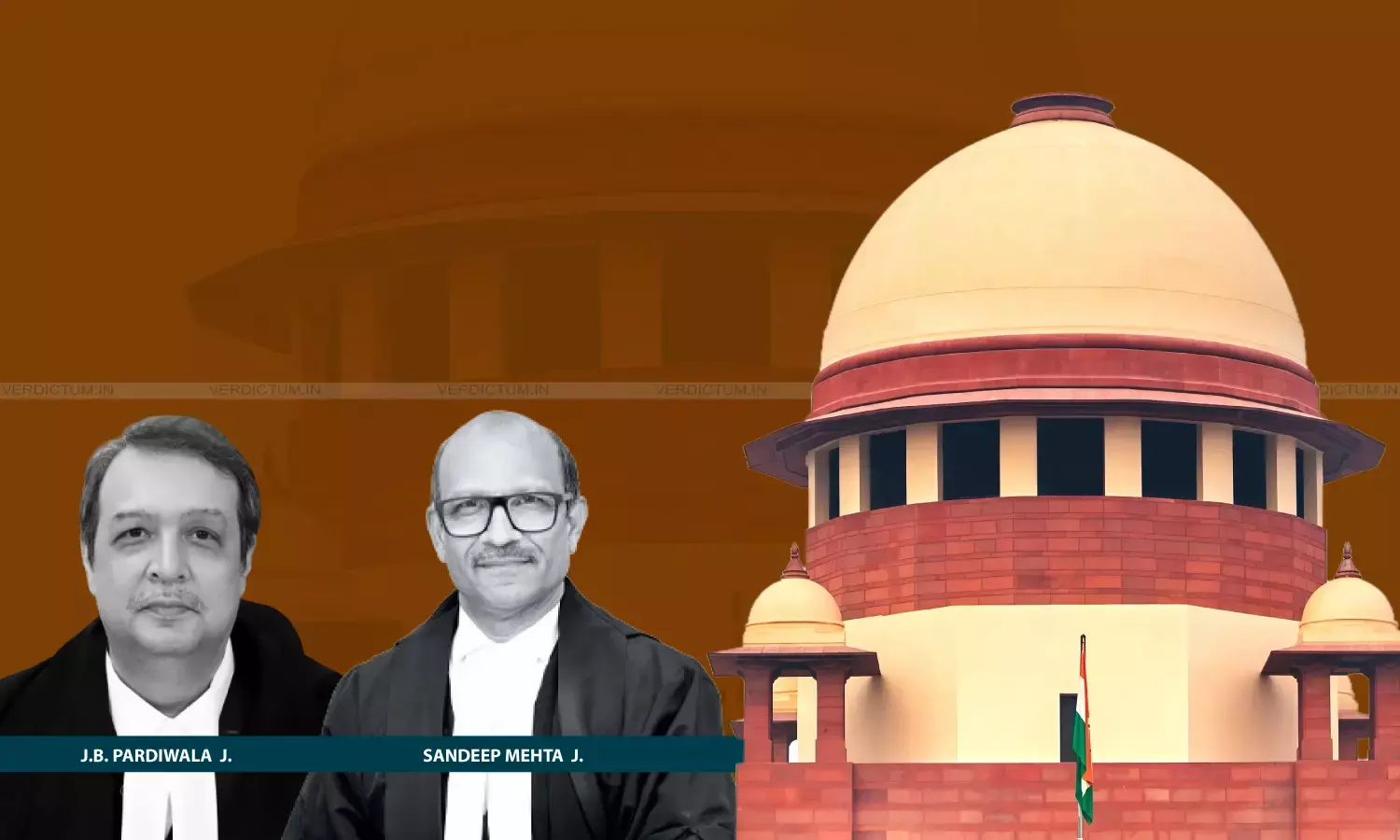Transactions Undertaken Not Within Purview Of “Real Estate Agent” Under Finance Act: Supreme Court Dismisses Appeals By Service Tax Commissioner
The Supreme Court dismissed Appeals challenging the common Judgment of the Customs, Excise and Service Tax Appellate Tribunal, (CESTAT).

Justice J.B. Pardiwala, Justice Sandeep Mehta, Supreme Court
The Supreme Court has dismissed the Appeals filed by the Commissioner of Service Tax, New Delhi against a real estate partnership firm.
The said Appeals challenged the common Judgment of the Customs, Excise and Service Tax Appellate Tribunal, (CESTAT) passed in a Service Tax Appeal.
The two-Judge Bench of Justice J.B. Pardiwala and Justice Sandeep Mehta held, “… we are of the firm opinion that the transactions/activities undertaken by the respondent with SICCL did not bring it within the purview of ‘Real Estate Agent’ or ‘Real Estate Consultant’ as defined under Sections 65(88) and 65(89) of the Finance Act, 1994, respectively. These transactions were not undertaken for service charges, commission, agency or consultancy but were plain and simple transactions of sale of land, which are expressly protected under the exception clause to the definition of the ‘Service’ referred to supra.”
The Bench said that for invocation of extended period of limitation under the proviso to Section 73(1) of the Finance Act, 1994, the Commissioner was required to prove deliberate suppression and concealment of the material facts on the part of the company to evade the tax liability.
Advocate V. Chandrashekara Bharathi appeared for the Appellant, while Senior Advocate Balbir Singh appeared for the Respondent.
Factual Background
The Respondent was a partnership firm which was engaged in the business of purchasing, selling, developing, and dealing in lands, buildings, and other allied activities. It had entered into three separate but substantially identical Memorandums of Understanding (MOUs) with M/s Sahara India Commercial Corporation Ltd. (SICCL) for the acquisition, development and management of land parcels for its real estate project at Sahara City Homes, Sri Ganganagar (Rajasthan), Vadodara (Gujarat), and Kurukshetra (Haryana) respectively. An investigation was initiated by the Directorate General of Central Excise Intelligence on the allegation that the Respondent had received substantial consideration without discharging the liability of service tax.
The Directorate General, prima facie, concluded that the Respondent squarely fell within the purview of a “Real Estate Agent” as defined under Sections 65(88) and 65(89) of the Finance Act. The Respondent was then issued a show-cause notice (SCN) by the Commissioner and pursuant to the adjudication thereof, vide Order imposed a penalty and demand of tax against the Respondent. Being aggrieved, the Respondent preferred an Appeal under Section 86 of Finance Act. The Appellate Tribunal allowed the same and this was under challenge before the Apex Court.
Reasoning
The Supreme Court in the above regard, observed, “… for a person to be covered under the definition of ‘Real Estate Agent’, there must be attributable to such person, an act of rendering service. The section does not cover a direct transaction of sale and/or purchase inter se between two individuals or entities, as the case may be. Likewise, ‘Real Estate Consultant’ is a person who renders services in form of advice, consultancy or technical assistance for the purposes as set out in Section 65(89) of the Finance Act, 1994.”
The Court was of the opinion that the Appellate Tribunal did not commit any error in holding that the Respondent did not act as a real estate agent or a consultant while acting in furtherance of the MoUs entered with SICCL.
“The profitability of the respondent was contingent upon the rate at which land was procured by it from the sellers”, it added.
The Court noted that the transactions inter se between the Respondent and SICCL under the said MoUs are covered within the exceptions as enumerated in the definition of ‘Service’ under Section 65B(44)(a)(i) of the Finance Act.
“The respondent admittedly transferred title of land to SICCL after negotiating the price thereof with the owners and procuring a Power of Attorney to execute the sale deeds. Hence, these activities were purely of sale/conveyance of immovable property which clearly falls within the exception as provided under Section 65B(44)(a)(i) of the Finance Act, 1994, reproduced supra”, it further said.
The Court remarked that the Commissioner erred in raising the demand of tax and imposing penalty upon the Respondent and therefore, the view taken by the Appellate Tribunal in setting aside the Order does not suffer from any infirmity warranting interference of the Court.
“Admittedly, all the transactions inter se between the respondent and SICCL were through valid banking channels and thus, there was no element of concealment or suppression by the respondent warranting invocation of the extended period of limitation by the Directorate General under the proviso to Section 73(1) of the Finance Act, 1994”, it also noted.
Conclusion
Moreover, the Court observed that the Appellant has failed to adduce any evidence or establish that the Respondent engaged in wilful or deliberate suppression of material facts, and there is nothing on record to suggest that the Respondent acted with any intention to mislead the authorities or evade payment of service tax.
“To be specific, the appellant failed to satisfy the Court that the respondent was under any obligation to seek clarification as to whether its activities with SICCL would bring it within the scope and ambit of a real estate agent”, it added.
The Court, therefore, concluded that the transactions in question neither fall within the definition of a “Real Estate Agent” nor that of a “Real Estate Consultant” under the Finance Act, 1994.
Accordingly, the Apex Court dismissed the Appeals.
Cause Title- Commissioner of Service Tax v. M/s Elegant Developers (Neutral Citation: 2025 INSC 1299)
Appearance:
Appellant: AOR Gurmeet Singh Makker and Advocate V. Chandrashekara Bharathi.
Respondent: Senior Advocate Balbir Singh and AOR Abhisth Kumar.


